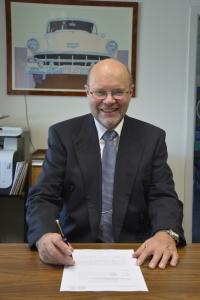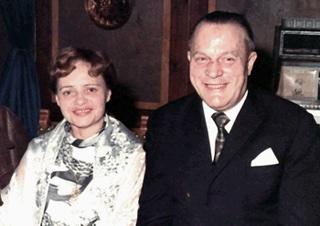HISTORY
FAVORED PROTOTYPE SPECIALIST SINCE 1924
The history of AKS Industries
The name AKS is derived from the founder of the company, Anton Kjær, and S is for Son. That’s where I enter the picture.
Anton Kjær was born in 1916 as his parents’ 12th child. Anton started his career as the son of a poor man. Anton’s father ran a small cotter’s farm of 5 hectares, 2 of which consisted of shifting sands. This modest piece of land was not enough to feed the family, so my grandfather earned a little extra by going from farm to farm selling woollens.
My father used to say: “We never starved when I was a child, but we never had meat. We lived on fish and potatoes, and in the summer we had vegetables as well.”
My father went to school for 3 years, and of course there wasn’t school every day back then. When there was work to be done in the fields, especially during the harvest season, it went without saying that the school closed.
My father was a shepherd when he was 8, and he enjoyed this work. But by the time he was 12, he worked at farms, which he certainly did not like, because he had to live with strangers. But his father and mother had no other option, as they couldn’t feed all their children.

When my father grew up, he worked as a farm hand. Later he found work in the brown coal mines, but there was great poverty in the area, so my father decided to go to the capital. The problem was that many others were doing the same thing, so there was a lot of unemployment and poverty in Copenhagen. And things didn’t become any easier when the war came to Denmark. My father acquired a cart and walked through the streets of Copenhagen selling brushes, shoelaces and the like.
In 1943 he married his Rosa. My mother came from a family just as poor as my father’s.

My mother had lived her entire life in a circus wagon. My mother and father then found a small flat in the poorest area of Copenhagen. This was the first time my mother had ever lived in a place without wheels underneath the floor boards. During the war it was difficult to get raw materials for the brushes, but being used to life on the farms, my father went to the countryside and cut the horses’ tails off, for which the owners charged him only a small sum. In this way he was able to continue making brushes throughout the war.
In the early 1950s, my father was one of the first to manufacture tractor brushes. This system is still used today, among other things for snow clearing.
In the mid-1960s, my father bought a machine shop following the death of the previous owner. This factory is among the oldest in Denmark as a supplier for radio manufacturers. In 1970 I was hired as a smith. Now my father had three employees in his machine shop. As the radio and television manufacturers closed down, we found new customers within the electronics, drug and process industries.
The factory has always been a subcontractor. We manufacture chassis, cabinets, faceplates, tanks and control panels and perform turning and milling tasks.
Though our founder is now dead, his visions of putting the customer first, making them feel welcome and serving them well are still alive in AKS. The same is true of his vision that AKS should continue to grow. This is achieved through competent, well-trained and committed employees and by constantly investing in the latest technology in order to make the best quality goods at the lowest price and in the shortest delivery times.
In order to achieve the best, competitive prices, AKS has, among other things, set up a factory in Poland.
We have established ourselves in the city of Swinoujscie, which is one of Poland’s biggest ports. It is the Polish city closest to Denmark.
Swinoujscie has several ferry departures to Denmark every day, which means that we can also deliver goods from Poland “just in time”.
